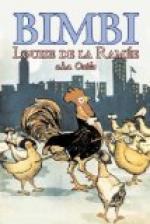In the attic Raffaelle passed the most anxious hours of all his sunny little life. He would not allow Luca even to look at what he did. He barred the door and worked; when he went away he locked his work up in a wardrobe. The swallows came in and out of the unglazed window, and fluttered all around him; the morning sunbeams came in, too, and made a nimbus round his golden head, like that which his father gilded above the heads of saints. Raffaelle worked on, not looking off, though clang of trumpet, or fanfare of cymbal, often told him there was much going on worth looking at down below. He was only seven years old, but he labored as earnestly as if he were a man grown, his little rosy ringers gripping that pencil which was to make him in life and death famous as kings are not famous, and let his tender body lie in its last sleep in the Pantheon of Rome.
He had covered hundreds of sheets with designs before he had succeeded in getting embodied the ideas that haunted him. When he had pleased himself at last, he set to work to transfer his imaginations to the clay in color in the subtile luminous metallic enamel that characterizes Urbino majolica.
Ah, how glad he was now that his father had let him draw from the time he was two years old, and that of late Messer Benedetto had shown him something of the mysteries of painting on biscuit and producing the metallic lustre which was the especial glory of the pottery of the duchy!
How glad he was, and how his little heart bounded and seemed to sing in this his first enjoyment of the joyous liberties and powers of creative work!
A well-known writer has said that genius is the power of taking pains; he should have said rather that genius has this power also, but that first and foremost it possesses the power of spontaneous and exquisite production without effort and with delight.
Luca looked at him (not at his work, for the child had made him promise not to do so) and began to marvel at his absorption, his intentness, the evident facility with which he worked: the little figure leaning over the great dish on the bare board of the table, with the oval opening of the window and the blue sky beyond it, began to grow sacred to him with more than the sanctity of childhood. Raffaelle’s face grew very serious, too, and lost its color, and his large hazel eyes looked very big and grave and dark.
“Perhaps Signer Giovanni will be angry with me if ever he knows,” thought poor Luca; but it was too late to alter anything now. The child Sanzio had become his master.
So Raffaelle, unknown to any one else, worked on and on there in the attic while the tulips bloomed and withered, and the honeysuckle was in flower in the hedges, and the wheat and barley were being cut in the quiet fields lying far down below in the sunshine. For midsummer was come; the three months all but a week had passed by. It was known that every one was ready to compete for the duke’s choice.




